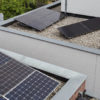At this point, it’s pretty much a given that you’re going to expect a 20+ year warranty on any solar panels worth their salt. Indeed, almost every solar manufacturer offers 25 year warranties against their product. It’s kind of an industry standard.
But, truth be told, those 25 or even 30 years warranties are quite worthless.
Surprised?
Allow us to explain.
Written in the best legalese possible, solar warranties are rarely what they seem. They also come with plenty of exit clauses that can render them useless. This is why you need to really pay attention to both what’s written on the contract and the product’s spec sheet to really know what you’re getting.
You also need to arm yourself with the right questions for your installer so that no details are missed. Let’s take a closer look at what solar warranties are and how they work.
The Many Different Types of Solar Warranties
There’s no one all encompassing solar warranty that covers the entire PV system, top to bottom. Each solar power system comes with four types of warranties that last for different durations and are eligible under different conditions.
Performance Warranty: Performance warranties usually last for 25 to 30 years. These are the ones you will see printed in bold on website product pages and the one salesmen will keep gently coaxing your eyes to. A performance warranty guarantees that a panel’s performance will stay above a certain threshold for the duration of it’s warranty period.
For instance, a solar panel may be guaranteed to see a 10% reduction in output over the first 10 years and a total of 20% reduction in output over 25 years. If your solar panel’s output drops below this limit with no discernible cause, then the performance warranty can be availed.
In practice however, these warranties are little more than a marketing stunt. Solar panel outputs drop at around 1% every year. Even if a panel’s performance does drop below this limit, there are plenty of legal loopholes built into performance warranties to guarantee they cannot be availed. More on this in the next section.
Product Warranty: This is the actual warranty you want to keep an eye out for. Product warranties cover manufacturing defects and poor workmanship and typically have a five to 10 year time limit.
It’s important to understand the difference between performance and product warranty. Many of the reasons that will lead to performance loss are actually covered under product warranty clauses.
So, poor solar panel performance can be due to defective PV modules, improper assembly etc which are actually covered by the panel’s product warranty and not its performance warranty.
In other words, you won’t be able to have your panel replaced or fixed past its product warranty limit even if it came with a 30 year performance warranty.
Most CEC accredited solar panels come with at least a 10-12 year product warranty with SunPower offering a very impressive 25 year product warranty against their panels.
Inverter Warranty: While a solar inverter is a hardy little device, they are also the most abused. Solar inverters are constantly trafficking high voltage current both from and into your home, which makes them liable to fail more often than solar panels.
Most solar inverters have a life span of 2 to 20 years depending on their make, and type. Battery based inverters fair the worst with a lifespan of 2 to 5 years. String and central inverters can keep working for around 10 years. While micro inverters have a service duration of 20-25 years.
It’s not surprising then that the warranties usually match the expected service life of an inverter. Enphase micro inverters for example come with a 25 year limited warranty.
Installation Warranty: AKA workmanship warranty offers protection against any problems that may arise due to improper installation. These warranties differ from installer to installer. Some installers may offer a guarantee rather than a warranty where they will be willing to repair or replace parts that aren’t performing as expected.
Some questions to consider here are – will the installer take care of the entire system or just certain parts? Will you have to pay for a service visit? Will the installer arrange for defective components to be replaced, or, will that burden fall on you?
It’s Not Just About What’s Written On the Paper
Warranties just like insurance are quite pointless if the service provider tries to wiggle their way out of them when push comes to shove. This is where a solar partner on your side can help you out. At bidmysolar™, we understand the importance of selecting the right people and the right equipment. Our installer vetting process is the most thorough in the country and we ensure only the best, most experienced CEC accredited solar installers are made available to you. We also help you every step of the way, from designing the solar power system, to installation and follow up service calls, should they be required.
Learn more about how we work, or feel free to give us a ring if you’d like to learn more.





